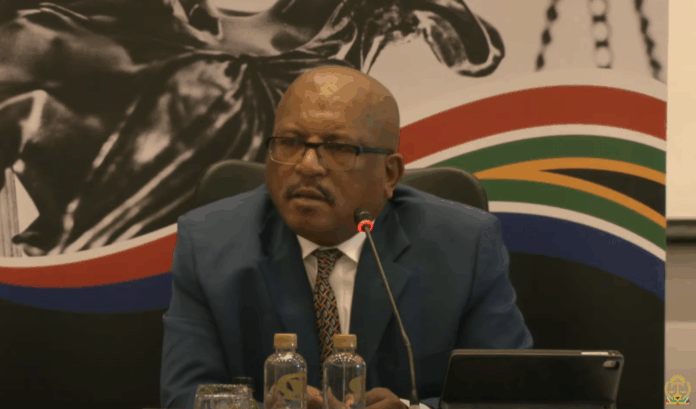Free State High Court Judge President Cagney Musi has been accused of denying accountability in a leadership role in the controversial Nulane corruption case that has been criticised as a failure of justice by the Supreme Court of Appeal (SCA).
This happened while Musi was being interviewed for the position of deputy chief justice on Thursday.
Judicial Commissioner and MP Fassiha Hassan raised concerns about the handling of the Nulane matter.
Numerous errors of law
She referred to the SCA judgement and quoted the court’s view that the accused’s acquittal on fraud charges was “baffling” and that the high court had committed “numerous errors of law”.
The SCA last month found that there was a prima facie case of fraud and money laundering and ordered a retrial on the matter. This came after the SCA upheld the appeal by the Investigating Directorate Against Corruption against the judgement of Acting Judge Gusha.
Gusha had on April 21 2023, discharged the accused in the Nulane case. However, the SCA ruled that the accused may be tried before a different judge.
The accused are Iqbal Sharma and his company, Nulane Investment, former Free State Department of Agriculture high-ranking officials Peter Thabethe, Limakatso Moorosi, Seipati Dhlamini, Ronica Ragavan and the company she represents, owned by the Guptas, Islandsite Investment; and Dinesh Patel, who is Sharma’s brother-in-law and a representative of Nulane Investment.
Suitably skilled, experienced judge
Hassan grilled Musi that, as head of the court, he should have ensured that such a high-profile case was assigned to a suitably skilled and experienced judge.
Musi responded in defence of his decision, saying the acting judge Gusha, who presided over the case, had sufficient experience in criminal court, more than some of the judges in the division.
“If I appointed, for an example, a judge with two years’ experience on the bench who comes from a background doing only civil matters, one: it wouldn’t have made a difference.
“Two: when we appointed this judge as an acting judge, we knew about her experience and have seen some of her matters on appeal. We had spoken to the regional court president because I don’t appoint people from the regional court without making sure that I discuss it with the regional court president,” said Musi.
Provincial judiciary’s independence
Hassan further raised concern and questions about the asbestos case involving former Free State Premier Ace Magashule, saying that the National Prosecuting Authority (NPA) has taken an extreme decision that the matter should be presided over by a judge outside Free State.
She said this shows, among other things, a possible lack of confidence in the independence and integrity of the provincial judiciary.
“I don’t think that we can just sweep this under the carpet by saying these were the credentials of an acting judge, which was clearly wrong.
“But I am very concerned now because the entire reputation of your division is at stake. The country is feeling a further failure of the criminal justice system. The NPA has actually been exonerated by the SCA. And you are now appearing before the JSC asking for us to consider you to be the deputy chief justice,” said Hassan.
Safety issues
Musi emphasised that the NPA wanted to bring in a judge from outside the province to ensure the safety of those that are within Free State.
He said he was still at the SCA at the time. But he had consulted his deputy and decided that there was no substance.
“You must be mindful that those cases are not the only two corruption cases that were in the Free State. There were many, many, many other cases. And they were dealt with swiftly and justly and properly. There is no outcry about them,” said Musi.
Minister of Justice and Correctional Development, Mamoloko Kubayi, dismissed claims that the NPA had considered the appointment of a judge outside Free State for safety reasons.
Kubayi noted several letters, which she said have been circulated publicly raising issues such as biasness.
However, Musi insisted that the letters do not make reference to Free State judges being biased.



